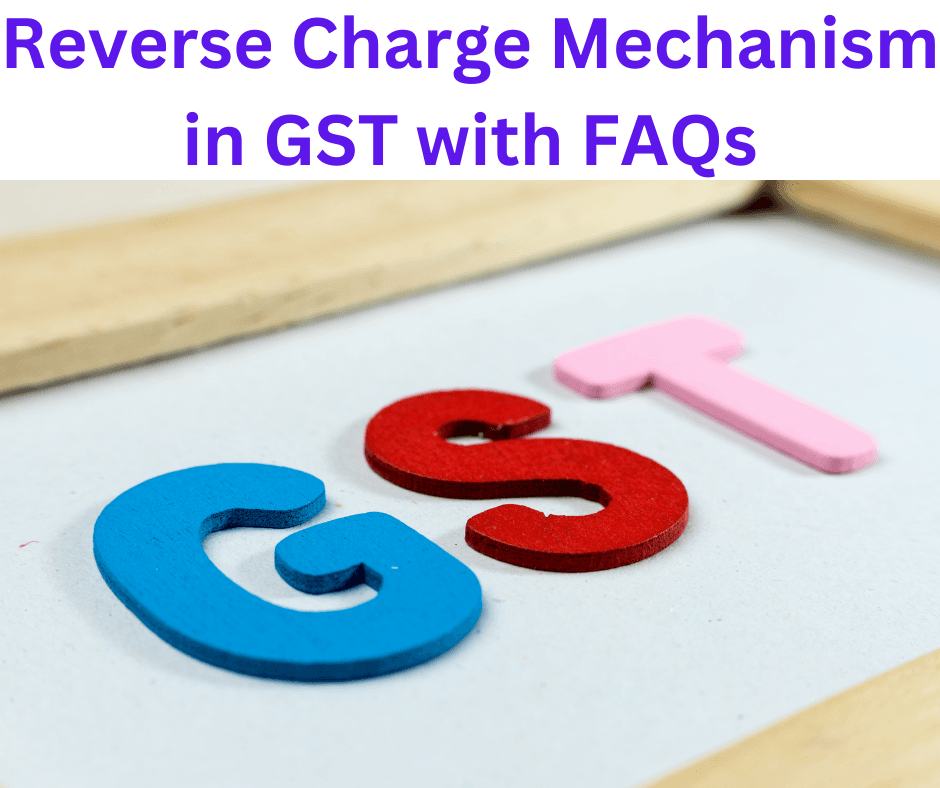Reverse Charge Mechanism in GST with FAQs
Reverse Charge Mechanism in GST with FAQs The Reverse Charge Mechanism (RCM) under GST is a unique provision where the responsibility to pay tax shifts from the supplier to the recipient of goods or services. This guide explains the key concepts, provisions, scenarios, and compliance requirements, along with a detailed FAQ section to address common queries.
What is Reverse Charge Mechanism (RCM)?
In most GST transactions, the supplier collects and remits the tax to the government. Under the Reverse Charge Mechanism (RCM), the liability to pay GST is shifted to the recipient of goods or services.
RCM is applicable in two situations:
- On specified categories of goods and services (notified by the government).
- On taxable supplies received by a registered person from an unregistered supplier.
Legal Provisions of RCM
- Section 9(3) of the CGST Act
Specific categories of goods and services are notified for reverse charge.
- Section 9(4) of the CGST Act
RCM applies to taxable supplies made by unregistered suppliers to registered persons.
- Section 5(3) & 5(4) of the IGST Act
RCM provisions under the IGST Act are similar but applicable to inter-state transactions.
Scenarios Where RCM Applies
Notified Goods Under RCM (Section 9(3))
| S. No | Description of Goods | Supplier | Recipient |
| 1 | Cashew nuts (not shelled/peeled) | Agriculturist | Registered person |
| 2 | Raw cotton | Agriculturist | Registered person |
| 3 | Tobacco leaves | Agriculturist | Registered person |
Notified Services Under RCM (Section 9(3))
| S. No | Description of Service | Supplier | Recipient |
| 1 | Legal services by an individual advocate | Advocate | Business entity |
| 2 | Services by a director to a company | Director | Company |
| 3 | Sponsorship services | Any person | Body corporate/firm |
Transactions with Unregistered Suppliers (Section 9(4))
- GST is payable under RCM for supplies from unregistered persons to registered persons. Reverse Charge Mechanism in GST with FAQs
- Exemption: Supplies below ₹5,000 in a day from unregistered suppliers are exempt.
How to Determine the Time of Supply Under RCM?
The time of supply for goods or services determines when GST becomes payable:
For Goods
- Date of receipt of goods,
- Date of payment, or
- 30 days from the date of invoice (whichever is earlier).
For Services
- Date of payment, or
- 60 days from the date of invoice (whichever is earlier).
RCM Payment and ITC
- Payment: GST under RCM must be paid using the recipient’s electronic cash ledger. Reverse Charge Mechanism in GST with FAQs ITC cannot be used for this purpose. Reverse Charge Mechanism in GST with FAQs
- ITC Claim: The recipient can claim ITC on the GST paid under RCM, provided all conditions for availing ITC are satisfied.
Compliance Requirements Under RCM
- Tax Invoice: Suppliers must issue an invoice stating that the tax is payable under RCM.
- Filing of GSTR-1: Reverse Charge Mechanism in GST with FAQs Recipients must report transactions under RCM in Table 4B of GSTR-1.
- Books of Accounts: Maintain proper records of all RCM transactions. Reverse Charge Mechanism in GST with FAQs
- Advance Payments: RCM applies to advances as well, requiring payment of GST on such amounts.
Examples of RCM Transactions
Case 1: Import of Services
Scenario: A company in India hires IT services from a provider based in the US.
Liability: The Indian company pays GST under RCM.
Case 2: Legal Services
Scenario: A company avails legal advisory services from an independent advocate.
Liability: The company must pay GST under RCM.
FAQs on Reverse Charge Mechanism (RCM)
- What is the purpose of RCM in GST?
RCM ensures tax compliance in cases where collecting GST from the supplier is challenging, such as unregistered suppliers or specific notified categories.
- Can ITC be claimed for GST paid under RCM?
Yes, the recipient can claim Input Tax Credit (ITC) on GST paid under RCM, provided they meet all eligibility criteria.
- Does RCM apply to import transactions?
Yes, GST on import of goods or services is paid under RCM by the importer.
- Are there any exemptions under RCM?
Reverse Charge Mechanism in GST with FAQs Certain transactions, such as supplies below ₹5,000 per day from unregistered suppliers, are exempt from RCM (as per earlier notifications).
- How is RCM reported in GST returns?
RCM transactions are reported in Table 4B of GSTR-1 and must also be included in GSTR-3B under the “Tax on reverse charge” section.
- Can GST under RCM be paid using ITC?
No, GST under RCM must be paid in cash through the electronic cash ledger.
- Is RCM applicable to intra-state and inter-state supplies?
Yes, RCM applies to both intra-state and inter-state supplies based on the nature of the transaction and notified rules.
- What happens if RCM compliance is not met?
Non-compliance with RCM can lead to penalties, interest, and disallowance of ITC claimed on such transactions.
Conclusion
The Reverse Charge Mechanism (RCM) is an essential provision to ensure tax compliance under GST. Reverse Charge Mechanism in GST with FAQs Businesses must understand its applicability, maintain accurate records, and comply with reporting and payment obligations to avoid penalties.
For further queries or professional assistance with GST compliance, feel free to reach out!
For More Information :https://taxgyany.com/

